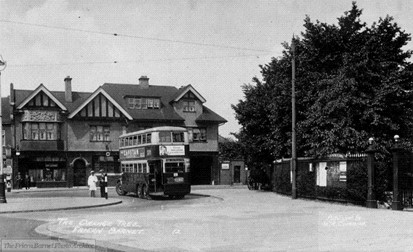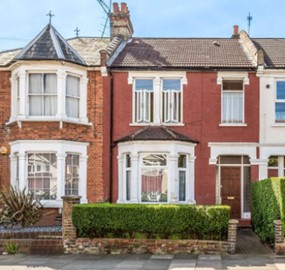Goldsmith Road, Friern Barnet
From The Orange Tree[15] pub, opposite the Town Hall at Friern Barnet, you walked left down Friern Lane and onto Goldsmith Road, which is on the first right. Walking down that road on the right is Kennard Road, followed by Hartland Road, Ramsden Road, then MacDonald Road. Continuing along Goldsmith Road, Number 3[16] is the last but one house on the right before Stanford Road. Number 1 Goldsmith Road, the last house, was where Mum’s sister Maisie was to live later on during the war.
Number 3 itself was a Victorian bay windowed house with a small front garden surrounded by a privet hedge. Two large steps—the top inlaid with red and blue tiles—led to an imposing front door with stained glass panels. Similar stained glass panels were to the side of the door, which were all inside a porch and set off the appearance of the house. The door had a large brass bell on the side panel, a brass knocker and a large-handled brass letterbox. When rubbed with Bluebell polish, these would sparkle and shine—a job I was to enjoy doing.
As a child, I remember the little front garden being unattended, except when Mum would have a go at it, clipping the hedge and the tangle of brambles beneath the bay window. A few flowers grew underneath the hedge, mostly Lilly of the Valley and dandelions.
After Elsie and Frank had settled in at Goldsmith Road, they realised that they soon would be a family of three; I was on the way. Mum was a healthy young woman and looked after herself as soon as she found out about her pregnancy, and, having worked looking after children, was not worried about being a mother. Dad seemed pleased, although he still liked to go out for a pint with his brothers at The Triumph, The Orange Tree, or The Cricketers at North Finchley which was another of his haunts.
Maud and Lucy—Dad’s sisters—made matinee coats for the new baby, and so did Grandma Trusler who did a lot of knitting. During the end of Mum’s pregnancy, there was a bus strike and she was given a ticking off by the Doctor at the North Middlesex Hospital for walking most of the way there just to keep an appointment.
At last the day came. Mum had been uncomfortable all night and was admitted to hospital the next day, where, on 30th September 1937, I was born in time for tea. Mum’s father Jim, Grandad Trusler, had been ringing the hospital all day, eventually being told ‘it’s a little girl’—his first grandchild— and he was delighted. The nurses said I looked like a little Chinese baby because I was so dark.
Grandad Trusler collected the new pram from the shop at East Finchley and walked all the way to Friern Barnet with it, complete with a new cover and pillow he and Grandma Trusler had bought.
The day came for Mum to come home. Grandma Trusler came too with her things, travelling with her back to Friern Barnet. However, a shock awaited them. Frank’s sister Maud, Fred and Bobby had moved out of the downstairs flat at No. 3, and Dad had started to move some of Mum’s furniture downstairs, but the job had not been finished. He had gone to work leaving the place upside down with beer bottles in the grate.
Grandma Trusler soon got cracking. She rolled up her sleeves, made some tea, made up the baby’s cot and began clearing up the mess. When Dad came home the rest of the furniture was promptly moved down and soon everything was in its place. Mum breathed a sigh of relief.
The only thing now, was they only had two rooms instead of four upstairs, but at least they had the garden to wheel the baby out for fresh air and somewhere to hang the washing. A new tenant came to live upstairs and life settled down again, with Dad busy with his bricklaying work. Maud, Fred and bobby had moved to Chelwood, a large house on Oakleigh Road in Whetstone. Auntie Maud had the job of Caretaker and they lived in half of the house downstairs.
Elsie and Frank were now parents. Mum loved the baby and she felt so proud wheeling the pram out, the baby all nice, clean and fresh, dressed in hand-knitted clothes, with a little white bonnet edged with swansdown. Dad did not fuss the baby a lot, because, after all, it was considered women’s work, but he was pleased when his daughter was admired. He would have preferred a son of course, but perhaps next time.
Mum would feel full of energy, always busy changing and bathing the baby, washing the clothes, polishing downstairs, walking to East Finchley to her mum and dad’s and brother’s and sister’s houses. Elsie’s family loved the baby and her two brothers Jim and Harold loved to see her too. Once baby was tucked up for the night, Mum would feel tired. Breast feeding had soon got her figure back to its trimness, but by teatime she had to have a rest. The baby grew chubby and rosy-cheeked.
‘Don’t over feed her,’ the clinic doctor said. ‘She will get rickets if she’s too heavy.’
The back garden at Goldsmith Road was quite big so Dad made a small vegetable plot. There was a plum tree which must have been there for years and we planted a white lilac. There was an old coal shed, and later on Dad built a long shed to house some rabbits he kept at the bottom. It was never a beautiful garden, but it is where me and Barbara played as children, hiding in the privet hedges, making bonfires in the autumn and snowmen in winter. We lived in our garden in the summer, never wanting to come in at bedtime.
Dad would call out what had became a regular line of his: ‘Just popping round to Mum’s.’ It often meant that he would not be back until after 10 o’clock at night when the pub closed. He would call in at the Cricketers or Triumph for a pint, which Elsie got used to, glad to put her feet up and do some knitting or read the news.
The news was not too good, as things were getting bad in Europe with talk of war. Surely not after the first one with all that suffering? Elsie tried not to think about it and enjoyed being a mum. At this time, Elsie’s sister Maisie was courting Pete, and Ada had found a nice young man called Tom.
Elsie’s dad was not looking too well and was suffering with his chest. Grandma Trusler had noticed that Frank did not come with Elsie to visit them.
‘He is treating you right, girl, isn’t he?’ Grandad would say to Elsie.
‘Oh, yes, Dad. You know how he likes a sleep-in on Saturday afternoons?’ She would always change the subject.
Soon, I was tottering about, to Mum’s delight.
‘Look at her, Frank. Isn’t she doing well?’ Mum would pick me up and sit me on Dad’s lap.
‘Oh eh, you take her,’ he would laugh. ‘She might be wet.’
Mum thought that he should be more interested in his daughter.
I was christened ‘Elsie Lucy’, at the Holy Trinity Church, in Church Lane, East Finchley, and my mum’s family made afternoon tea to follow. Once I had begun walking, Aunt Edie, Grandma Trusler’s sister, went with Mum to buy me my first pair of proper shoes.
Auntie Edie, had worried Grandma Trusler when she had fallen pregnant as a young woman. Such a thing was thought a disgrace in those days. After her confinement in a Salvation Army home for young women, her son was adopted, but who later on as a young man, kept in touch with Aunt Edie and called her ‘Mum’. Later on, Edie married Albert Furlow and they settled down and had a daughter, Sylvia.
When the flat upstairs next door at Number 1 Goldsmith Road became vacant, Mum spoke to the landlord who was kind enough to let Auntie May (Maisie) and Uncle Pete have it; their daughter Betty had just begun walking and the rooms where they had lived in at East Finchley had been very dirty. After they moved in, Uncle Pete made a wooden gate for the top of the stairs, so that Betty could play in safety. Uncle Pete, being disabled, could not go into the Army, but he had a night job at a local factory.



Leave a Reply